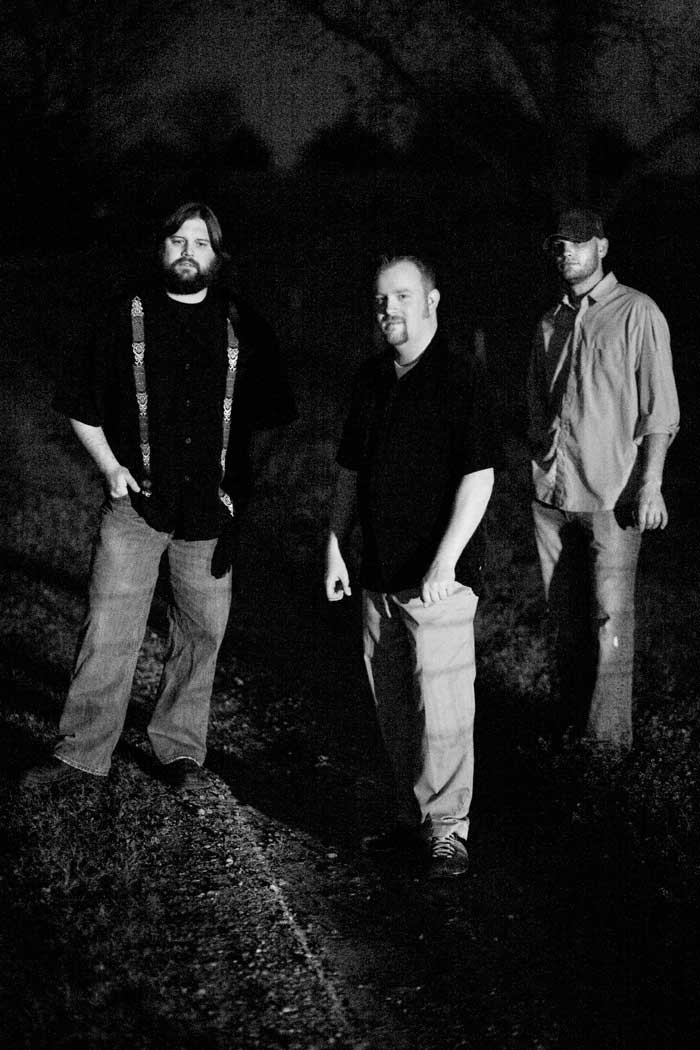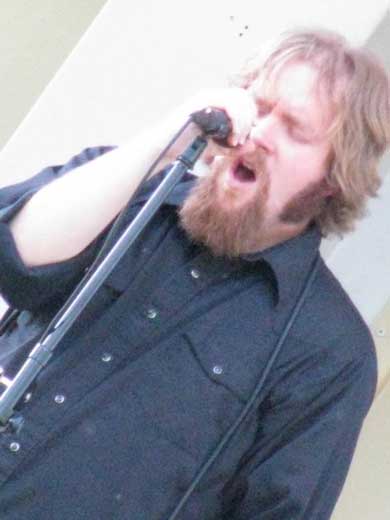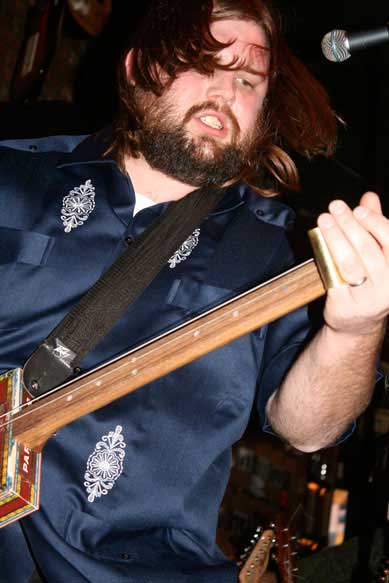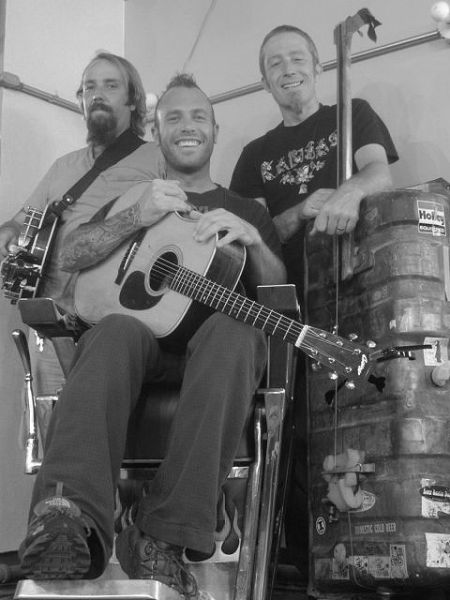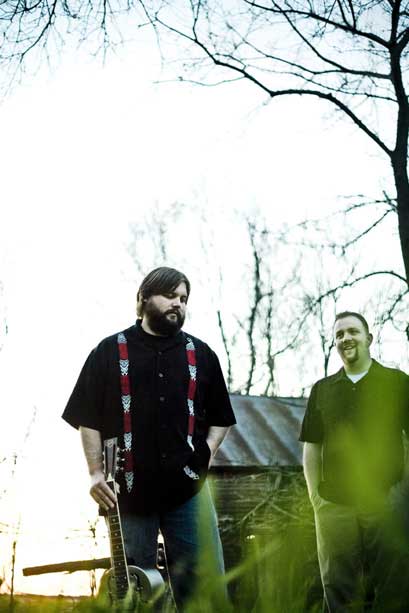The Hills Are Alive
With 1861, Moreland & Arbuckle Take the Blues, and Themselves, to Higher Ground
By David McGee
From left: Aaron Moreland, Dustin Arbuckle and Brad Horner. Says Arbuckle: 'That's the dream, right? To make a living doing what you really love. And to be happy. That really can take you a long way towards happiness, to be able to do what you love.'
This is ground zero for many developing bands, regardless of genre. Native Kansans Aaron Moreland and Dustin Arbuckle, who are joined by a drummer in a powerhouse blues trio that is billed as Moreland & Arbuckle, are heading to their next gig as they always do—in a van, hurtling through the night and the day to the appointed venue. Moreland answers a call on his cellphone, and through the crackling connection identifies their location as “in Phoenix, and the cell phone service is a little weird here. We’re playing Cave Creek, Arizona, tonight. We were in Tucson last night.”
When his caller reveals his home town to be Tulsa, Oklahoma, Moreland perks up. “Hey, we played the Cherokee Casino in Tulsa! Casino gigs are kinda lame, because nobody comes to hear you, but they pay pretty good. But right now we’re down in the desert, and it’s cool to be here. I’m glad we’re playing shows.”
Playing shows, and playing more shows, is what Moreland & Arbuckle have been doing since teaming up some six years ago after meeting each other at an open mic night in a Wichita, KS, club. Moreland, then 27, and Arbuckle, then 20, had both served time, if you will, in what Moreland diplomatically describes as “low-level success bands,” adding: “I played in tons of garage bands in my late teens and when I was in college.” At the time they met, Moreland had been doing solo and duo gigs (with another guitar player) “that was pretty much blues,” but otherwise the two musicians had been honing their chops in rock bands. Moreland, a guitarist, joined a blues band Arbuckle had been playing in for several years, called Morning After. About six months later, upon the dissolution of Morning After, the duo started their first group together, the King Snakes, which brought them closer to what they envisioned doing together initially, that is, playing the blues. Whereas Spinal Tap had its exploding drummers, the King Snakes had its disappearing bassists. After losing a second bass player, Moreland and Arbuckle buckled down to the blues and became a duo, Moreland & Arbuckle, sometimes supplemented by a drummer (the first being David Floyd, the current one being Brad Horner).
“After the second bassist left, Dustin said we could handle this without a bass player,” Moreland recalls. “I was pretty reluctant to do it, but to tell the truth, I wish we had done it a long time ago. It’s worked out better.”
Moreland is a master of understatement. It’s worked out so well that the duo/trio’s third album, 1861, released this past spring, is a flat-out hill country blues monster. Calling it one of the best albums of the year is to diminish it. It has classic written all over it. The ferocity of its energy is nigh on to overwhelming, starting with the first blazing cut, a steamroller version of Hound Dog Taylor’s pitiless “Gonna Take Ya Back to Georgia,” featuring Moreland’s searing, screaming slide work, and Arbuckle not only spitting out the verses with appropriate gutbucket muscle and monumental disdain, but adding rich, rollicking, deeply textured harmonica support, as drummer Horner hammers away relentlessly, keeping the whole endeavor careering towards a glorious, stop-time conclusion. Two other covers include a thundering take on R.L. Burnside’s “See My Jumper Hangin’ Out On the Line,” a tailor-made showcase for Arbuckle’s virtuoso dynamics on the harp and rich, sassy vocal; the third cover ought to shine some well deserved light on Oklahoma City songwriter Ryan Taylor (of the now-defunct Rounders, which released one album on the Blind Pig label), who penned “Pittsburgh In the Morning, Philadelphia At Night,” a homicidal stomper concerning the conflicted feelings of a fellow who realizes his woman wants to kill him after he awakens with a dead rooster in his bed (Taylor’s original lyric had a land mine in the bed, but Arbuckle changed it because “you know, he talks about in the song how his woman wants him dead. I mean maybe she's trying to put a hex on him—that's where the dead rooster thing comes from. It’s kind of a voodoo imagery thing…”). Nine other cuts are all M&A originals, all immaculately conceived and breathtakingly executed, whether it’s the spare, Delta blues of “Wrong I Do,” with Moreland showing a deft touch on the Resonator and Arbuckle demonstrating a powerful, moving gift for lowdown blues moaning in a lament that is dark as the night is long; the foreboding “Tell Me Why,” a mean woman blues written after the guys had visited Fred McDowell’s gravesite that is occasion for another showcase of Moreland’s stinging Resonator style and Arbuckle’s low-key, eerie, McDowell-like moan; or, most notably, the steamroller drive and stunning historical and emotional sweep of “The Legend,” a relentless rhythmic assault in service to Arbuckle’s vivid account of a Vietnam veteran who reclaims his life after the war, then loses everything again when the horrors he experienced in the jungle overtake him and he plunges off the deep end into alcoholism and self-humiliation (“when the time came/my nightmares were as vivid as the day/with whiskey I tried to kill it all away/till my fears came pouring down like shards of rain/Lord, I was drowning in the bottle back in 1989/praying it would dull my pain”). (“The Legend”’s rich, bottom heavy rumble not only stems from Moreland’s steady, upper strings riffing but from ballast supplied by bassist Jeffrey Eaton of Wichita’s dynamic country/bluegrass group Split Lip Rayfield, whose self-constructed instrument is identified on the album as a “gas tank bass”—and so it is: the body is a gas tank from a 1978 Plymouth Grand Marquee, with a neck carved from hickory and a length of Weedwhacker line serving as the string. “He tears that thing up, man,” Moreland says, with no small measure of awe in his voice. “Smacks it and pounds it. It’s amazing; it really is.”). And for good measure, with friend Chris Wiser sitting in on B3, M&A offer up a couple of what could be called the Great Lost Allmans tracks in the dense, swirling boogie of “Diamond Ring,” with Arbuckle reaching down for a gutsy, spiteful vocal that would have done the young Gregg Allman proud in its blend of full-throated shouts and guttural moans; and the closing, spacey “Wiser Jam,” six minutes-plus of medium-cool instrumental dialogue and soloing (Moreland’s trebly, soaring lines at one point are positively Santana-like), with Wiser injecting robust fills and dramatic, humming chords as the song winds down to a fiery fadeout.
You may not think you’re in Kansas anymore, but you are.
'As a young boy/I roamed the backwoods of Chautauqua County…'
Dustin Arbuckle: ‘As a songwriter I don't know that I'm trying to do anything differently; I think I've just gotten better at doing what I was always trying to do—write about the things I care about, write about things that mean something to me. And in a lot of cases that's stuff that relates to family and home, love, life and all that.’
Photo: Tina TerryBorn, respectively, on December 16, 1974, in Emporia, Kansas, and December 25, 1981, in Wichita, Aaron Moreland and Dustin Arbuckle came from working class families that surrounded them with music but didn’t particularly encourage either lad to pursue it on a professional level. Moreland says his father “didn’t really raise me, but I come from a long line of players”; Arbuckle’s father had been a drummer in his youth, but after returning from service in Vietnam he gave up the instrument—Dustin has no memory of his father playing “in my lifetime, but music was very important to him and something that was, always going on in our house, he was always playing records. I have a really vivid memory of riding in the truck with him when I was about three years old, hearing him singing a Lead Belly song. It's one of my earliest music-related memories. So having a person who was very musically inclined definitely had a big influence on me.”
Moreland, deeply influenced by punk rock, had been knocking around the aforementioned garage bands when, at age 22, he experienced what he refers to as his “Son House moment,” that being the age he was when he heard, for the first time, the Delta blues giant’s monumental “Death Letter Blues.”
“It totally blew my mind, this one guy with one guitar,” he recalls. “I thought, Geez, this is what I want to do. After that point I really focused on electric guitar; and even before that I really always loved blues a lot, but it was at that very moment—the Son House moment—that it was, yeah, this fires me up more than anything I’ve ever heard. It was the playing, the emotion, the power and the electricity that was being generated by one person with one guitar. Six strings and his fingers. The overall feeling.”
Arbuckle’s immersion in deep blues was an incremental process, evolving out of an early love of blues-influenced music of different genres. “When I was really young a lot of the music I liked best was blues influenced. Really early rock ‘n’ roll, Chuck Berry, a lot of soul, some country. Like most young kids I listened to a lot of really crappy music too. But looking back there was a lot of listening to blues at the time I was about 15. There was some stuff like Elmore James and really early B.B. King that really struck me. I guess it hit me in such a way that no other music ever had; and the more blues I listened to the deeper I got into it. It consumed me even more. And the further back I went, until I got into Charlie Patton and harmonica players like Little Walter, Sonny Terry, Sonny Boy Williamson. Guys like that were all really huge influences.”
Although Moreland does take a vocal now and then, Arbuckle is the voice of M&A, and a gifted one at that. Singing, he says, is something he’s done pretty much since he could utter words, but it was with his discovery of the blues in his mid-teens that he felt a calling to this music that had entranced him. At this point his father did intervene, with a suggestion that he learn to play an instrument and not be strictly a singer. For eminently practical reasons, he gravitated to the harmonica.
“I thought, Well, harmonica's small, and cheap, it won't be a huge investment if I'm not that good at it. So that's what I went with first, and it worked out. I took to it. Of course the great thing about harmonica is that you can carry it with you anywhere. The first couple of years I played you wouldn't find me without a harmonica in my pocket. Walk around between classes playing, stuff like that.”
About the time he started mastering the harmonica, Arbuckle also began writing songs. Writing and writing, as he tells it, drawing inspiration from the same cross-genre spectrum of blues-influenced artists that had first riveted his attention and beckoned him into the life. First and foremost, he mentions Charley Patton, noting, “The way he wrote his songs, you could tell that they had specific references to the places that were important to him and the places that had had an impact on his life. He took so much from his surroundings and put them into his songs.” The songs of Hank Williams and Johnny Cash elicited a country strain in his writing, and he also gives a nod to Split Lip Rayfield’s Wayne Gottstine for inspiration. “Lately I've been writing more songs that are in the country and bluegrass vein, and [Gottstine’s] way of writing really impacted a couple of songs I've written more recently.”
As both young men tell it, an instant bond formed when they met at the fateful open mic night in Wichita.
Moreland: “I’d say we hit it right off the bat. I remember the first time we sat down and jammed together and thinking, Wow, this works really good. So obviously, like anything, it’s evolved a bit. But the funny thing is we finally have the kind of band to do what we set out to do. Because when we had the bass players, they didn’t want to do what we wanted to do, and that was part of the problem.”
Arbuckle: “When we met things kinda clicked between us. Aaron was playing more Delta blues kind of stuff and it was what I really wanted to be playing, rather than the blues-rock stuff that I was playing with most of the cats I was with at the time. What was great about that was that our musical vision was so much closer than it had been with other guys I had been playing with. The people I had been playing with earlier, we tried to write songs together and there hardly had been anything that had really come to fruition because we didn't have similar ideas about writing songs. But Aaron and I thought in a very similar way.”
What may have made the duo work so well on the writing end was the specific influences Arbuckle embraced, and Moreland’s gut feel for a song’s structure, absent any specific influence. “I like so much different stuff and so many different styles that it’s just a matter of trying to find the hook and the melody and the right chord structure that pulls it all together,” Moreland explains. “So I really would have a hard time citing any one or small group of specific writers that really speak to me personally. I love ‘70s punk rock almost as much as I do Muddy Waters. I just have a lot of influences and a lot of different styles that have always moved me a great deal. I’ve been lucky to be able to figure out how to pull all those together.”
‘About as low-rent as you can go…’
Aaron Moreland in concert, playing his cigar box guitar. Built for him by a friend in Memphis, it has one bass string, three guitar strings and two outputs. He plugs the bass string into an onstage bass amp and plugs the guitar side into his guitar amp, ‘so it’s a huge sound. From the moment I played it I thought, ‘This is totally going to redefine our sound and put us in a new category. And it has, without question.’
Photo: Art TipaldiAt the point they were developing their acoustic duo incarnation, Moreland and Arbuckle decided to document what they were doing on record. In 2005, producing themselves in a friend’s home studio that Moreland describes as “about as low-rent as you can go,” they self-released (on their own Uncle Larry Records label) the all-acoustic Caney Valley Blues. The King Snakes were still together, but M&A knew that their duo was stronger than the band. Although Moreland says when he hears Caney Valley Blues today, he hears “the immaturity in the entire record, in the writing and the playing, like, Wow, there’s some pretty good stuff on here but it definitely did not have the polish that we have now or the development.” The next year, with drummer David Floyd added to the mix, they went electric on Floyd’s Market. The rawness of these essentially home recordings is apparent immediately upon first listen, but upon closer scrutiny both lay the groundwork for the fully realized, sonically compelling, mature work that is 1861. Here the duo/trio works out its influences in original songs, finds new paths into cover songs, and ultimately discovers its signature sound. On Caney Valley, the song “Don’t Bother” has a pronounced country feel, with harmonized verses and, to date, the only appearance of a mandolin on an M&A recording; “Old Like Me” features Moreland in a rare lead vocal appearance, proving his mettle as a blues growler. On Floyd’s Market (so named for an actual market in Sedan, Kansas, operated by David Floyd’s relatives), the signposts are even more telling. Junior Kimbrough’s “Meet Me In the City” asserts their natural-born feel for hill country blues in a propulsive arrangement that has a bit of Jimmy Reed in it as well (“That’s a pretty tough song,” Moreland says, “and it took us a little longer to pull that one together than some of the other stuff, but in the end it’s probably one of our best live tunes.”); “Long Way Home” is a funky, slide-enriched taste of Creedence-style swamp rock with Moreland fashioning some familiar-sounding, serpentine lead guitar lines around Arbuckle’s slinky vocal; true to its title, “Locomotive” boasts a purposeful drive and synergistic relationship between Arbuckle’s freewheeling vocal and Moreland’s wailing slide in what was, Moreland confirms, “definitely a catalyst for developing the way we sound now.” Nothing suggests a future direction, however, more than “Date With the Devil,” which showcases a hard driving trio assault of wild-ass drums, howling guitar, rich, shimmering harmonica and insouciant vocal that leads directly to the instant summer classic that kicks off 1861, Hound Dog’s “Gonna Send Ya Back to Georgia.”
Split Lip Rayfield, with Jeffrey Eaton (right) and his self-constructed gas tank bass, which he plays on Moreland & Arbuckle’s ‘The Legend’ on 1861. At far left is banjoist Eric Mardis, in the middle is guitarist Kirk Rundstrom, who died of esophageal cancer on February 22, 2007. The group has continued as a trio with mandolinist Wayne Gottstine, who had been with the group from 1998-2005, when he left for personal reasons. Check out the group’s impressive music at www.splitliprayfield.com
“As a songwriter I don't know that I'm trying to do anything differently; I think I've just gotten better at doing what I was always trying to do—write about the things I care about, write about things that mean something to me. And in a lot of cases that's stuff that relates to family and home, love, life and all that. I guess the one thing I've started doing more in the past couple of years is looking at songwriting as storytelling. I feel like a lot of my favorite songwriters were really good storytellers. I feel like that's what songwriting is, and it doesn't necessarily have to be your story, it just has to be a good one. I think I've progressed in the last three records learning how to tell a story within a song or thinking how to put together the story. I didn't used to be very good at that, and I still don't think I'm very good at it.”
Dustin Arbuckle, soft spoken and humble, underestimates himself. 1861, following only a year after Floyd’s Market, is a great leap forward for the duo. It’s more than the instrumental assurance the fellows display, even more than Arbuckle’s deeply emotional and colorful vocals—these are essential pieces of the puzzle, but in the end the songs drive the album, and the originals are, despite Arbuckle’s disclaimer, considerably advanced over what had sprung from his imagination heretofore. The specificity of detail in so many of the songs illustrates how well Arbuckle has absorbed the work of the masters whose art he has studied.
Consider, for example, “Never Far Behind,” a jubilant childhood reminiscence of life in the hills; a joyous track bristling with high spirits, percussive drive, energetic, insistent slide work by Moreland, and Arbuckle’s jittery harmonica work and lighthearted recounting of sweet, treasured memories— everything from the smell of breakfast cooking (“daddy’s got that skillet going/smell that bacon fryin’”) to running carefree through the woods with his dog hot on his trail to the sound of bullfrogs “moanin’ in the night.” You can practically taste the food and feel the clean, damp air in the woods.
'It's about my dad...'
But nothing stands out so much as “The Legend,” a truly monumental effort that compresses 20 years of tortured history into a little more than three minutes, in as vivid an account of a returning Vietnam vets’ horrors as Steve Earle offered in his own masterpiece of this type, “Johnny Come Lately,” which delineates the essence of some 30 years of American history in slightly more than four minutes.
Here, in discussing “The Legend,” Arbuckle confronts a deeply troubled personal history that haunts him to this day. This reporter stumbled upon it by accident, in the course of probing the duo about its approach to recording, which turns out to be not purposely casual, but also not worked out in detail prior to the sessions. Pre-production? Please.
“We don't do a whole lot in terms of arrangement and pre-production, things like that,” Arbuckle offers. “These songs came together pretty organically, I guess would be a way to put it. So many of our songs come together just jamming at practice; something that Aaron plays will make me think of a concept or think of something that turns into those lyrics, turns into those songs. Now a lot of times, after the initial inspiration, it takes more work to finish the song and get more verses together. But so much of it really does come together from jamming and the inspiration that comes out of that. A song like ‘The Legend’ is one that came kind of separately from that and the lyrics of that song were a very, very long time in the writing.”
“A very, very long time in the writing” is a phrase to seize on, if you’re trying to illuminate the duo’s creative process. So this is a great song that didn’t come easily, as opposed to others that evolved out of and took shape over the course of pre-session jamming. And according to the press notes sent out with the album, it’s based on a true story. So, naturally, a question arises concerning the background on the song’s protagonist.
“Uhh. Umm. Well.” Arbuckle hesitates, then hesitates again. “This, uh. The song's really...” On the other end of the line, he’s clearly having trouble collecting himself.
“Uh...sorry, kind of hard for me to talk about it a little bit, strangely enough, because I talk about it with my friends,” he says following a long silence and a weak, nervous laugh. “But the song's really about my dad.”
Another long pause. Arbuckle clears his throat, takes a breath, and begins again:
“He grew up in southeast Kansas, real rural upbringing, lot of hunting, fishing, worked on the ranch when he was young, ended up coming to adulthood in the late '60s and really got into the whole culture, the hippie culture, peace and free love, all that sort of stuff, rock 'n' roll and that whole deal. And when he, you know, got drawn into Vietnam, like so many other guys of his generation, I think, you know...you get the sense talking to a lot of (pauses), uh, I guess, a lot of the guys who went through that war, if you talk to them you get the sense that they had a very different experience than some of the guys who came home from World War II. The horrible experiences of war don't change. You're gonna go through things that people who haven't been there can't begin to fathom or begin to understand. But I think for guys coming back from Vietnam to some degree it added to the trauma. If you get into a situation where you've gotta kill to survive, if you've got any sort of conscience, it’s gonna mess with you. Coming back from Vietnam was hard on him too. A lot of people didn't like the war, and he didn't like the war in the first place, he never wanted to be there, couldn't re-adapt to society when he came home. Just kind of wandered and was on his own for a long time before he came back and started to rebuild his life. And over the course of about ten or fifteen years he did; he became very successful, had a really successful business, met my mom and they were married in the late '70s and I was born in '81 and everything was really peachy for several years there. I guess around '86 or '87, he started having a lot of things just start going downhill. A lot of the stuff he'd suppressed for so many years really started to come back. He didn't feel he had anybody he could really talk to about anything, so a lot of the stuff just stewed. I don't know. He started drinking a lot more than he had before. Lost his business, which had an effect on everything. He stopped being able to handle stress, you know, became just a really terrible alcoholic in a very short period of time. Our family kind of fell apart. That brought us to the end of the '80s, beginning of the '90s, and it's been a pretty rough go of it for him ever since. Can't seem to keep his life very stable ever since then. Obviously you have choices; there are choices that have to be made, but a lot of it goes back to things he experienced then.”
Are you still in touch with him? Do you talk to him?
“Oh, yeah. Yeah. We talk,” Arbuckle answers in a strong voice. “We've had some weird times over the years, but it's cool. It's fine.”
“The Legend” is powerful, moving art torn from muscle, blood and bone. In addressing a cultural/social/political trauma that not only persists in America in 2008 but also is recurring as more damaged vets return from Iraq and Afghanistan, this unflinchingly personal song speaks to a larger purpose than any other number in M&A’s original repertoire. This too is hitting close to home with a couple of young men who have seen their friends ship out to the war zone.
“One of my best friends since I was very young is over in Afghanistan right now,” says Arbuckle. “He's getting ready to come home, done a couple of tours. We haven't really talked a whole lot about what he's gone through over there, and I hope it's not anything at the level of what my dad went through; and I hope he feels like he can talk to people when he comes back. So the same thing that happened to a lot of Vietnam vets doesn't happen to these guys. But unfortunately I think it is.”
A Long Way to Happiness
Things are looking up for Moreland & Arbuckle these days. They may be out on the road tooling from gig to gig in a van, toting their own gear and setting it up (and in Moreland’s case, leaving a wife and two young sons back in Wichita; Arbuckle, resolutely single, says he leaves “only a roommate” behind when he goes on the road), but they’ve got a lot going for them all of a sudden. 1861 is the duo’s first album for the nationally distributed Northern Blues label and in June they signed with Piedmont Talent, the booking agency that represents Johnny Winter and Smoking Joe Kubek, among other blues stalwarts. Reviews of 1861 have been universally laudatory. There will come a time to focus on what’s ahead, but after seven long years of humping, they’re in a good place.
“I couldn’t be much happier,” Moreland asserts. “It’s a slow, building process, doing roots music, especially. There’s no massive pop mainstream interest in it, but I think that’s okay, because in the end you build a stronger, more loyal audience. That’s certainly our intention. We’re in this for the long haul. We’re here to make the music we love, not just be a flicker today and gone tomorrow.”
“You know, I just really love making music,” Arbuckle says, hastening to add, “We both really love making music and we really love making music with each other. One of our major goals is to be able to do that for a very long time, for the rest of our lives to continue making music together. You hope to get to a point with it where we can maybe make if not our entire living off it, or at least maybe the majority of it. That's the dream, right? To make a living doing what you really love. And to be happy. That really can take you a long way towards happiness, to be able to do what you love.”
THE BLUEGRASS SPECIAL
Founder/Publisher/Editor: David McGee
Contributing Editors: Billy Altman, Derk Richardson
Logo Design: John Mendelsohn (www.johnmendelsohn.com)
Website Design: Kieran McGee (www.kieranmcgee.com)
Staff Photographers: Audrey Harrod (Louisville, KY; www.flickr.com/audreyharrod), Alicia Zappier (New York)
E-mail: thebluegrassspecial@gmail.com
Mailing Address: David McGee, 201 W. 85 St.—5B, New York, NY 10024
Founder/Publisher/Editor: David McGee
Contributing Editors: Billy Altman, Derk Richardson
Logo Design: John Mendelsohn (www.johnmendelsohn.com)
Website Design: Kieran McGee (www.kieranmcgee.com)
Staff Photographers: Audrey Harrod (Louisville, KY; www.flickr.com/audreyharrod), Alicia Zappier (New York)
E-mail: thebluegrassspecial@gmail.com
Mailing Address: David McGee, 201 W. 85 St.—5B, New York, NY 10024

